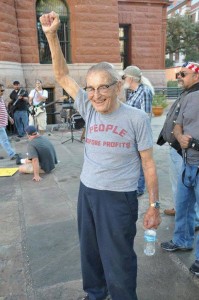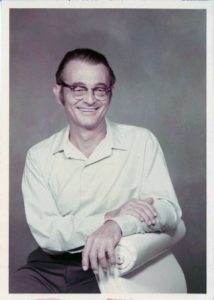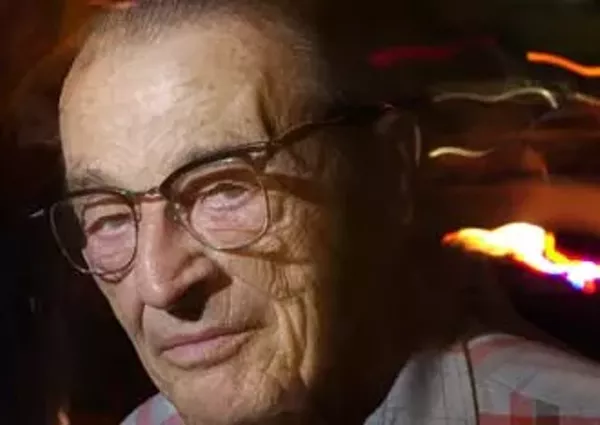At 79, he has outlived his most outspoken critics and several spans of public scorn. Most of those who know his name today are activists or labor liberals — and they have only praise for him, despite his long and entirely public or “open” membership in the Communist Party, USA.
“He’s a true organizer, of a dying breed,” says Graciela Sanchez, director of the Esperanza Peace & Justice Center.
Those who have dealt with Stanford over the years say that rather than pose as a militant, he speaks in the voice of consensus and prudence.
 Tom Flower, a Vietnam-era protester, now an Anglican minister better known for work among the homeless, argues that, “actually, John is pretty conservative about doing things that might upset people. He doesn’t like to put leaflets on people’s windshields, for example.”
But Stanford wasn’t always viewed as the mild character that he seems to be today. There was a time when he was seen as a threat to the free world.
In 1950, he entered the peace movement by circulating the Stockholm Peace Petition, which called for banning nuclear weapons, and was roundly viewed as a conspirator in a global plot to further Stalin’s aims.
Stanford says that the joined the Party on the day after his discharge from the U.S. Navy in 1946. He became an activist within weeks, soon after re-enrolling at the University of Texas at Austin. Late that year, the Houston Informer reported that Stanford gave a speech in the basement of a Baptist church, under the sponsorship of the youth wing of the NAACP.
“White students are learning that it is time for them to fight for the rights of the Negro people,” he declared, characteristically throwing in a bit of wishful thinking. “If we increase our unity, we can make of the South a place where everyone can have a decent living, health, and education facilities.”
Stanford, who is white, delivered his Houston speech to support a lawsuit by Heman Sweatt, a black postal worker, to gain admission to the University of Texas law school. It was not the kind of speech that ordinary white men gave in that era of poll taxes and statutory segregation.
“In the South in the 1930s and 1940s, there were very, very few whites who spoke out for racial equality,” explains Maurice Isserman, the nation’s leading scholar on American communist affairs. “To do so was to put your life at risk.
And in many instances, the white Southerners who were willing to take that risk were in, or close to, the Communist Party.”
Sweatt’s legal challenge, won in 1950, is today seen as a precedent to the more-famous 1954 ruling in Brown vs. Board of Education, which ordered the integration of all public schools.
Because of his victory, Sweatt posthumously became a Texas hero, his portrait displayed at the Institute of Texan Cultures, a scholarship and college campus named in his honor.
|
|
| John Stanford was one of the few whites who spoke out for racial equality in the 1930s and 1940s. Photos by Mark Greenberg |
The Meerschaum pipe Members of the Communist Party customarily don’t reveal the names of members or former members who are still alive. But Sweatt’s death has freed Stanford to declare that at the time of the suit, Sweatt, too, was a Communist Party member. Unlike Sweatt, Stanford was never closeted, even if it was because he had little choice, thanks to the Texas Legislature and the Houston police. He moved to the Bayou City following his graduation from UT, and on September 16, 1948 — El Diez y Seis de Septiembre, Mexican Independence Day — the bilingual agitator was arrested for distributing Party leaflets decrying “the ruthless economic, political, and social oppression of the Mexican-American people.”
In 1951, Texas passed a Communist Control Act that required Party members to register with authorities, and prescribed a two- to 10-year prison term for failure to comply with the law. The Party decided to challenge the law’s dubious constitutionality, and Stanford, who was by then living in San Antonio, volunteered to be the test case, mailing an open letter to officials in 1952, declaring his membership. According to the plan, he was to refuse to register when the authorities responded.
But the 1950s were tough times for even the Party’s bravest members. Eleven national leaders of the group had been indicted under federal anti-communist laws, and some of them were already behind bars. After Stanford mailed his statement, the Party’s leadership found that it didn’t have the resources to pursue the Texas challenge, and ordered him to go underground.
“The Party had made a big mistake,” Stanford observes today. “It thought that fascism was coming.” He doesn’t remember everything that happened afterwards, partly because aging takes a toll, and partly, he says, because he tried to forget.
“I used to keep photo albums,” he recalls, “but when I went underground, I cut the faces out of the pictures, so that the FBI wouldn’t harass my friends. But the thing is, then I forgot, too, and can’t match names with faces now.”
To avoid arrest, he fled to Alabama, and knowing no one, found a job as a waiter at a diner and tried to lay low. But he couldn’t; it wasn’t in him to sit on the sidelines. After a few weeks in Birmingham, Stanford began attending meetings of a committee that was opposing fare hikes on city buses. Alabama bus fare activists, however, were wary of the Texan who showed up as if from nowhere; they thought that he was an FBI agent.
Stanford’s arrangement with the Party — like a scene from a movie about the French Resistance — was that he was to stay out of view for six months, then place a classified ad in the leading daily newspaper, saying that he had lost a meerschaum pipe. The person who called to report the discovery of the meerschaum, the plan went, would become his contact with the Party.
Stanford placed the ad and a young woman called. He asked her to meet him at the diner on a Sunday morning, when business was slow. Joanna Tylee walked in, she recalls, and upon seeing the Texan whom she remembered from the bus fare meetings, thought that she had walked into a trap.
The pipe plot had a happy ending: Joanna Tylee is today Jo Stanford. Following their marriage, John returned to San Antonio, and with her, reorganized the city’s frightened Communists and raised two children in the Jefferson neighborhood.
A Rosewood raid Back in Texas, prosecutors hadn’t forgotten Stanford. Through informers, they and the FBI kept eyes on the quiet-spoken protester, and as late as September 1963, San Antonio Express and News headlines assured its readers that “D.A. Still Studying Stanford.”
Officials had plenty of authority under which to act against him: Augmented by new measures, Texas laws by then prescribed 30-year prison terms for unregistered Reds. But the feds asked that Texas officials wait to nab Stanford until he could be designated as a Communist by the federal Subversive Activities Control Board, which delivered its finding on December 26, 1963.
Hours later, search warrant in hand, seven men from the district and state attorneys offices knocked on the door of the Stanford home, which was then on Rosewood Street, in the Beacon Hill area. John Stanford wasn’t home; Jo admitted the raiders and promptly telephoned the press. Meanwhile, her visitors began boxing some 2,000 books and various papers, including the couple’s marriage license, insurance policies, and mortgage schedule. The raid lasted for five hours. When reporters arrived, according to the Express and News, Jo welcomed them with, “Come on in and join the party!” But then she caught herself. “Or should I use another word?” she joked. The searchers claimed that the raid was necessary to prove that Stanford was imperiling public safety by selling Communist books and tracts through a mail-order bookstore in his home called All Points of View, which he had been operating since 1961.
In the months that followed, Stanford and his attorney, the late Maury Maverick Jr., were frequent subjects of the local press, whose handling of the affair betrayed an acquired admiration for the suspect. Reporters described Stanford as “affable,” and “pipe-smoking,” a designation that, in days before bongs, connoted “reflective” and “calm.”
Litigation over the book seizure wound up before the U.S. Supreme Court, where Maverick pointed out that among the confiscated items were copies of legal opinions on anti-communist laws penned by Justice Hugo Black.
“The reference to Justice Black’s opinion brought chuckles from the bench and several humorous exchanges that brightened the hushed dignity of the marble courtroom,” Express writer Ned Curran reported from Washington when the Court heard the case.
To almost no one’s surprise, the Court ruled the raid on Rosewood invalid, and the DA’s men, driving a borrowed red-and-white pickup, returned Stanford’s books to Rosewood.
They probably didn’t intend to aid or encourage the unarmed Stanford to overthrow the government, but the lawmen also gave him a gun, a .38-caliber pistol that had been taken for evidence in an unrelated case. Stanford, who has always claimed that he is for “socialism by peaceful and democratic means,” promptly returned the weapon.
Lingering suspicions Stanford’s victory before the Supreme Court kept him under public glare even after the ruling was old news. In 1965, an Express reporter grilled Stanford, who attended a demonstration to protest the killing of Reverend James Reeb during the Selma-to-Montgomery march led by Martin Luther King Jr.
Perhaps hoping to tarnish the voting rights movement, the reporter asked Stanford to justify his presence at the event. “I participated for the reason tens of thousands participated across the country — as a protest against the brutality being practiced against the Alabama Negroes,” Stanford shot back.
Six months later, his activities were again assailed in the local press when he sent anti-war leaflets to a mailing list that he had compiled, drawing a complaint from a soldier’s mother — not in San Antonio, but in distant El Paso.
“I believe the wars in Vietnam and the Dominican Republic endanger the lives of all American servicemen — including this woman’s son,” he told an inquisitor from the Express.
In the years since Vietnam, Stanford has taken part in dozens of other causes: the unionization of Valley farm workers, the campaign to Free Angela Davis, protests over U.S. involvement in Central America, and since 2001, Thursday peace vigils at the San Fernando Cathedral.
At protests against the U.S. occupation of Iraq, he is saying much the same thing today that he has said since 1946. “Capitalism doesn’t have a future,” he maintains. He insists that Soviet interests were only a marginal concern of his. “We weren’t concerned about Stalin’s policies during the 1950s, we were fighting against the poll tax,” he says.
Young demonstrators may dismiss Stanford as too old, and his trademark causes too dated to be relevant now, but they don’t suspect him, as their forerunners did, of joining their protests with a hidden agenda in mind. The ironies of history are endless, and one of them is that it’s not because he has spent more than 50 years on the barricades, but because there is no longer a Soviet state, that nobody questions Stanford’s sincerity today.
















